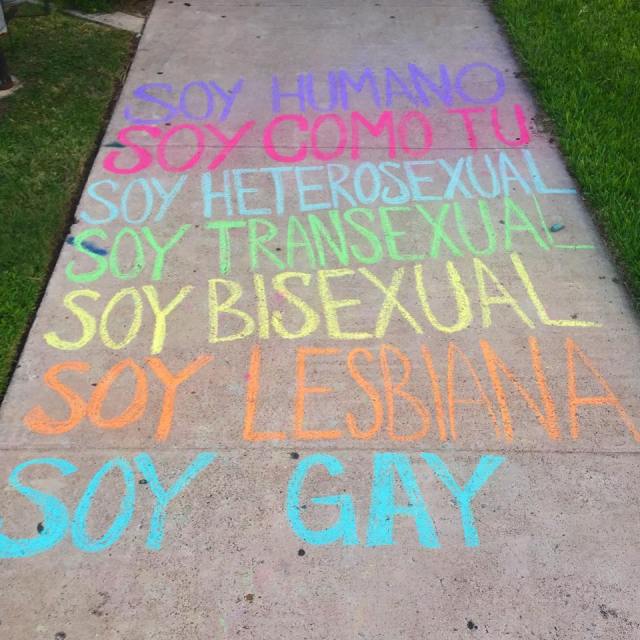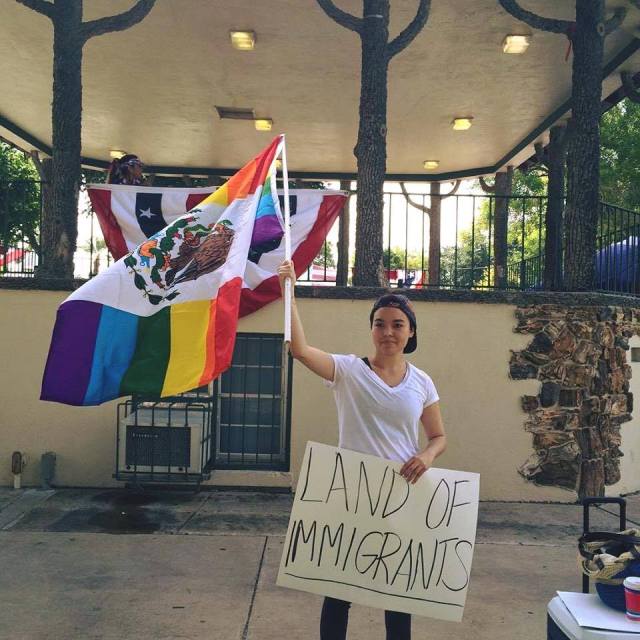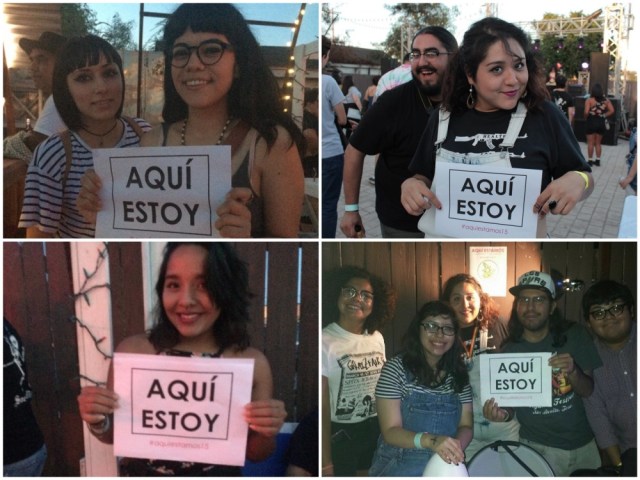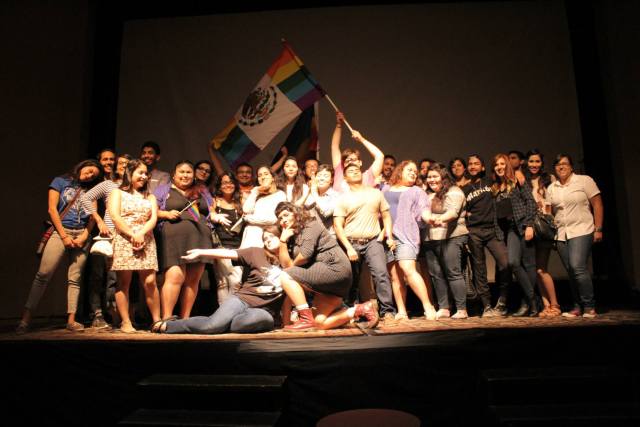I was 17 when I realized I wasn’t straight. I was in love with my best friend and no one knew. I was terribly afraid my friends, peers and teachers would find out that I was gay and think badly of me. I was paranoid my parents would find out and disown me. I was consumed with anxiety every single day because I couldn’t talk to anyone about it. In an area like the Rio Grande Valley, a region near the Texas-Mexico border — where 90% of the population is Latino, where there’s a dominant Catholic presence, and where machismo reigns — there’s some cultural setbacks for a young queer person to overcome. Never in my wildest dreams as a closeted teen could I have imagined anything remotely queer happening in the Rio Grande Valley. My inner teen self (also my adult self) is screaming with excitement because this week the first ever queer people of color conference, Aquí Estamos, will happen in the Rio Grande Valley and I’m going to be on a media panel! I’m extremely excited and proud something like this is happening where I grew up.
Aquí Estamos was an idea sparked by Dani Marrero and Eduardo Martinez during a Skype call. Dani, a student at Suffolk University, and Eduardo, a freelance writer in the Valley, had worked together on different writing projects in the past and were talking about their own activism and organizing when they thought it would be really cool if there was a queer people of color conference in the Valley. They shared the idea with friends and it took off. The pair teamed up with Alexis Bay, lead organizer and co-founder of Curando RGV; Erika G., writer and organizer; Samantha Herrera, community organizer; and Sarah Rose Maria Chavez, organizer for Sand2Pearl to create the planning committee.
“We all have been wanting this for so long — a space for us to really talk about what it means to be queer in the Valley and what tools we can provide to our community,” Marrero said. “When the idea came up we were like yeah, this needs to happen.”

Aquí Estamos is Spanish for “we’re here.” It was really important for the Aquí Estamos team to declare their presence as queer people of color not only in the Valley but in Texas and the U.S. It’s not surprising to find queer events in large urban cities where many queer people live but many don’t expect to find queer events in the South and in a conservative, rural-like area like the Valley. The team wants to undo those assumptions and make it known that there are queer people on the border. “The name represents us stepping forward and declaring our existence, our presence, and our narratives — all things that I feel have been largely dismissed by the mainstream media,” Marrero said.
To understand the significance of the conference, you have to know a little more about the Valley. It’s a borderland where the majority of the population is Mexican/ Mexican-American and has a high population of undocumented immigrants. It’s an interesting area and quite unique because of its location. It’s isolated from the rest of Texas because there’s a border checkpoint north of the region in Falfurrias, TX, making it difficult for undocumented folks and their families to ever leave the area. It’s also separated by the international Texas-Mexico border and the violence found in neighboring Mexican towns, which deters some Valley people, who may have family in Mexico, from crossing back and forth. In many ways, the Valley is a region with a culture all its own because of these two borders. In a country which dehumanizes and devalues immigrants, the Valley is wrought with socioeconomic problems. For one, the area is one of the poorest areas in the country, because there are so many undocumented people who can’t find work or paid below living wages and can’t get out of poverty. We’re an area with a high rate of high school dropouts, because many students are poor and have to work to help their families or they don’t have adequate time or resources to properly learn English in order to pass Texas’ standardized tests. And thanks a lot to the Texas legislature and other conservative forces, the area doesn’t have access to proper reproductive health resources and education so the Valley has a high rate of teen pregnancies and young, single mothers. These are just a few oppressive factors the Valley faces.

All this to say that many people in the Valley rely on family to survive. Sometimes family is all that these Latinos have when they’re faced with injustices everyday, so when the family structure is threatened, it creates instability for them. Queerness ostensibly threatens the Latino family structure, because it’s foreign, it transcends gender roles, the patriarchy, everything a Latino knows to be true and solid. If two women are together, how will they produce children that will eventually help provide for the family and continue the family name? How will they provide for the family if there isn’t a man to be the breadwinner? This is why I think it makes it much more difficult to be out in the Valley because it’s not really accepted by the very people who are your only support system. One of the greatest things the conference is providing is visibility to queer people in the Valley.
I first learned about Aquí Estamos from a member of the planning committee, Erika G., a high school friend and one of the first queer people I ever knew.
“I don’t want people to look at the Valley and think there isn’t a queer community here and that this queer community isn’t supportive of each other,” Erika said. “People think the Valley is a non-queer space but we’ve been here and we’ll be here. We’re just hoping to make it a much nicer place to live for people in the future.”

There is an already existing LGBTQ presence in the Valley with various organizations advocating for LGBT issues within their causes and a few organized Pride events, however the Aquí Estamos team craved an event that would enable their participants to learn and empower themselves with tools to address multiple issues that LGBTQ people of color face in the Valley, including immigration, poor education, poor healthcare and poverty. Instead of tackling questions about marriage equality, the team wanted to tackle questions like, “What does it mean to be a queer single mother of color?” and “What does it mean to be an undocumented queer immigrant?”
“I hope that people realize a lot of us aren’t fighting for single issues,” Erika said. “Hopefully this conference and the way we approached these things gets folks to start thinking of how we’re all dealing with so many issues and why it’s important to approach them with an intersectional framework. Trans women are only a small portion of the detained population but a huge portion of people who are getting assaulted. We have to ask, why is that happening? We need to look at our most vulnerable populations and put them at the center of our struggles.”
Some of the breakout sessions will cover topics like HIV in the Latino LGBTQ community, updating municipal laws to protect gender expression and gender identity, addressing misogyny in the queer community, and a training for parents of LGBTQ people. Aquí Estamos’ keynote speaker is Carlos Padilla, the National Coordinator of the Queer Undocumented Immigrant Project.

What’s most important for the Aquí Estamos team is to pass on knowledge to their own community. Most of the presenters, like myself, were privileged to attend college and had access to queer studies and terms in an academic setting. But the majority of these discussions stay in academia and aren’t shared with the public.
“We wanted to make a conference that’s free, that’s open to everyone, to get exposed to ideas that has been kept between a very high elite LGBTQ activist community and spread the knowledge out to everyone,” Marrero said.
Marrero says for many people in the Valley, who don’t go to college, they’ll never be able to access this type of information. An example of this is that many people in the Valley don’t know about famous lesbian Chicana author, Gloria Anzaldúa, a native to the region. Admittedly, I didn’t know about Gloria Anzaldúa until my senior year of college. Her work isn’t accessible in public school where most education is concentrated in the Valley. Aquí Estamos acknowledges that not everyone has the same level of education and LGBTQ awareness, that’s why the team has informed their presenters to break down words and definitions for things that might seem basic to them — for example, what “cisgender,” “transgender” or “pansexual” mean. The conference is striving to be a learning space.
“Even though for us, we’re used to being in the movement and we’ve been out for a long time, these terms might seem super basic but for many of our participants, who may have come out years ago, it’s going to be the first time that they are in a space like this so we want this to be a learning experience for everyone,” Marrero said.
In addition to making this a learning space, the team wanted to make the conference as accessible as possible to its participants. It’s free, first of all, and they’ll also provide food and childcare. Since the Valley is vast and public transportation is virtually nonexistent, they’ll arrange transportation accommodations. There are also Spanish translators available.
“We definitely don’t want a reason people can’t come to the conference to be like we didn’t have a ride or I couldn’t find someone to take care of my kid — that would suck,” Erika said. “Those are some of the very issues we’re talking about at the conference and it would suck to not have their voices part of the conversation.”
Last November I attended the Facing Race conference in Dallas and told you about all the interesting things I learned there. One of the greatest revelations I got from that conference was that I was needed at home in the Valley in order to see the change I wanted to see in the world. I realized it was people like myself who learned about different oppressions and wanted to take action to change them, we’re the ones needed at home to share this knowledge with our communities because we’re the ones who know them best. I’m the one that needs to have difficult conversations with my family and community, not someone who parachuted from a different state. I still believe this is true and Aquí Estamos is doing just what I think the Valley needs — its own people empowering their own community. What they’re doing in the Valley exemplifies grassroots organizing and I can’t wait to see what more they do.
“It’s such a critical space for us to have this conference so people can see that there are queer people here, ” Marrero said. “We do have our shit together and we do know what we’re talking about and we’re not just in the shadows, afraid. We’re out and we can identify our enemies — identity the social and political factors that affect us — and then we’re going to fight against them. I think it’s a really powerful statement to see people organize together outside of this secluded secret circle. That’s how I think it will translate to actual justice and change.”
Aquí Estamos Conference
August 6 & 7
STC Cooper Center in McAllen, Texas







